






Tips, tricks, & other resources for surviving & thriving at Bentley
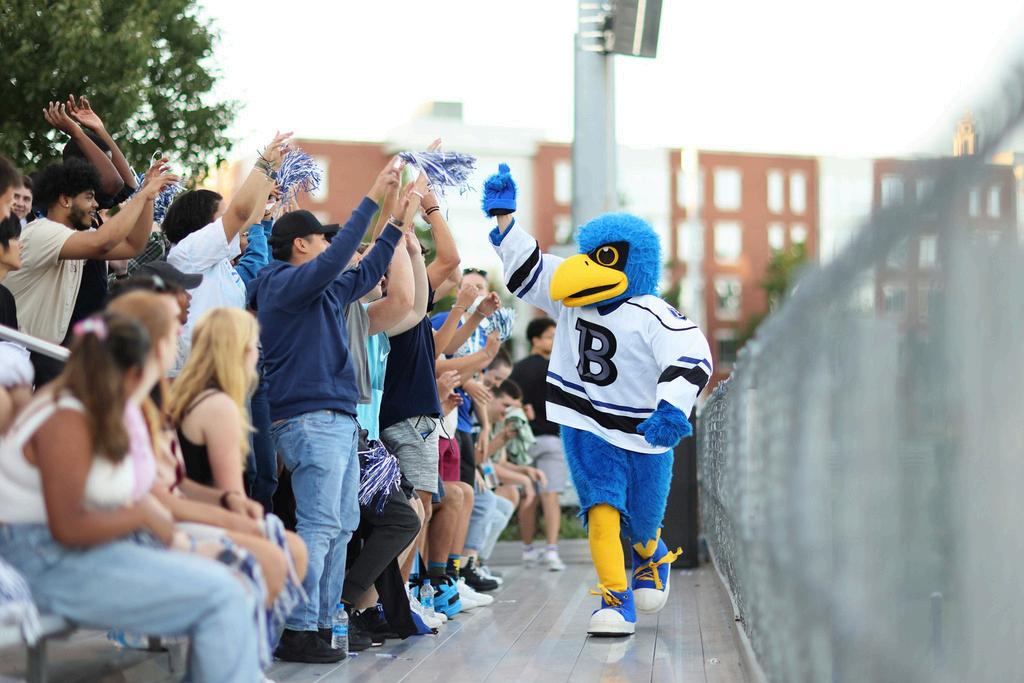
We're so happy you're here.
As you get to know the Bentley campus and community, you will experience numerous transitions and opportunities for growth and learning. It’s normal to have ups and downs when adjusting to a new environment, community, and lifestyle.
This guide is filled with how-tos, insider tips, and helpful reminders to help you feel at home at Bentley, as well as a list of resources and support for when you’re feeling stuck
Approach the new experiences that this year will bring with curiosity, self-compassion, and patience. You belong here, and we can’t wait to see what you bring to Bentley!
Transitioning to College Life
Building Community
Social Anxiety
Living with Roommates
Managing Social Conflict
Culture Shock
Homesickness
Resources
First Generation Students
Nutrition, Sleep, and Movement
Getting Outside
Navigating Campus
Budgeting
Budget-friendly Resources
On Campus Employment & Work Study
Financial Aid
Sending & Receiving Mail
Laundry
Healthcare
Understanding Insurance
Managing Mental Health
Mental Health Services
Community Wellbeing
Sexual Health
Interpersonal Violence Resources & Reporting
Community Safety
College Life & Alcohol
Seeking Support
College Academics 101
Academic Strategies
Academic Resources
Time Management
Growth Mindset
Imposter Syndrome
Disability Services
Embarking on the journey of college life brings many exciting opportunities and new experiences, but it’s natural to encounter challenges along the way. The tips below will help support you through a successful transition to Bentley.

Allow yourself to grieve. Take the time you need to say goodbye to the people or situations you’re leaving behind, reflect on what you learned from your previous life phase, and fully feel and express all emotions that come from these changes
Stick to a routine as much as possible. Schedules can help reduce feelings of uncertainty and anxiety and automate more familiar tasks while you’re learning new ones. Consider the regular habits that bring you a sense of peace and stability, such as going to bed at the same time every night, starting your morning with tea and 30 minutes of reading, or taking time to call home every Friday, etc.
Lean into your strengths. As you adjust to new expectations, reflect on what strengths have enabled you to persevere, make the most of opportunities, or prevent challenging situations from escalating in the past. How can you use these strengths to connect with other community members, develop new skills, or care for yourself through your transition? The Bentley+ Program can also help you identify new strengths to work on throughout the year, and pair you with a mentor to help you grow your skills!
Expand your comfort zone. You don’t need to leave your comfort zone behind to learn new skills, meet new people, or take advantage of new opportunities. The people, practices, places, and objects that bring you comfort are great resources to help you cope through seasons of change
an exercise for skill building & tolerating discomfort
Pick one thing that causes discomfort or pushes you out of your comfort zone.
1. Make a list of skills you need to develop or actions you need to take to feel more comfortable & confident.
2. Break this list down into smaller sub goals by outlining each action in a larger task.
3. Incorporate these actions or short skill-building practice to slowly build skills over time
4. Know that this will cause some discomfort -- pair these activities with grounding techniques and other coping strategies to help yourself learn to tolerate & work through discomfort.
5. If needed, reach out to schedule a counseling or coaching appointment for more support 6.
Reach out for help. There's no need to do this all alone. Bentley has countless resources to support you as you get adjusted to college life. See additional resources at the end of this guide for more information.
While college can bring some apprehension as a result of moving away from the friends, family, and community you’re comfortable with, it’s also an exciting opportunity to meet new people.
Just remember that making friends and rebuilding your social support network won’t happen overnight, or even in the first few weeks of college It takes time to get to know others
Building a new community at Bentley will help strengthen your feelings of security, belonging, and overall wellbeing.
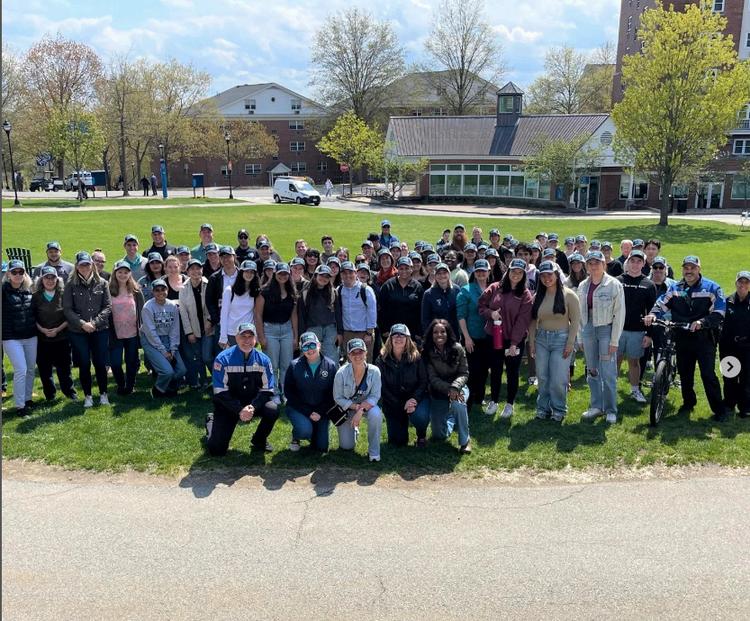
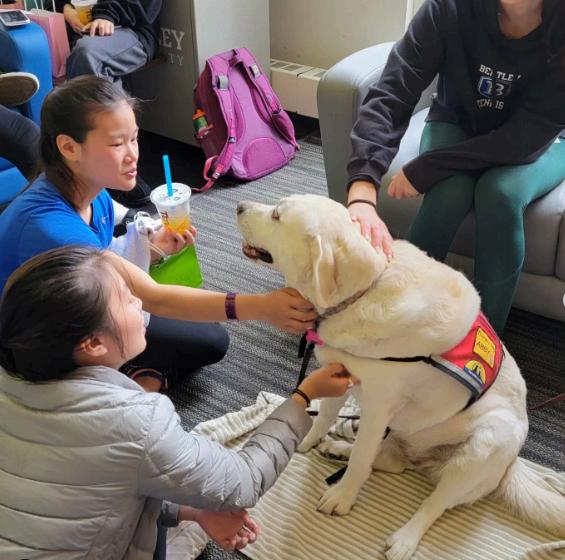
Introduce yourself - Reach out to new classmates, club members, or teammates, or introduce yourself to professors and TA (teaching assistants) after class! Mutual friends are great for facilitating introductions!
Manage your expectations for new friendships. You're not alone in the struggle to make friends, and it’ll take some time before your friendships feel as close as those you spent years building before college Prioritize recurring connections like weekly dinners, movie nights, or club meetings that will help you sustain new relationships over time.
Don’t forget about the value of casual acquaintances – not everyone will become a best friend for life, but they may be a part of your wider community! Making the effort to remember names and offer a warm smile is a small gesture that can have a big impact on your overall community
Listen with curiosity. When you're eager to get to know others and want to help them get to know you, it's not uncommon to fall into the trap of "listening to respond," and searching for your own talking points Instead, listen with curiosity and try to understand the person's experience, perspective, and feelings before your jump in with your own.
Participate in community traditions and events. Bentley has a culture and unique traditions of its own. Campus Groups is a great resource for finding on campus events and connection opportunities!
When people are in new situations or social groups (like the transition to college, for example!) it’s natural to want to feel connected and accepted by others. For some, it could also bring self-consciousness and anxiety. This pressure to always get it right can get in the way of authentic connections.
Courage comes before confidence. While it would be great to know exactly what to say and exactly how people will respond, there’s unfortunately no way to socialize that guarantees no awkwardness or insecurity. Having the courage to reach out without being able to control the outcome means you’ll have opportunities to practice your social skills and find the people you click with-- that’s what will help you gain confidence for future interactions.
If they don’t know you personally, don’t take it personally. It’s impossible to be liked by everyone. Think about it: do you like everyone you meet? It can be frustrating that we don’t get to control how others perceive us or that they may misunderstand who we are. Remember that you’re a lot more than the first impression of those who don’t know you well.
Aim to be present, not perfect. Perfectionism is the destructive belief that if we do everything perfectly, we can minimize feelings of judgement and shame Remember that you’re not auditioning for your place in someone else’s life -- you’re living your own, and deciding who else gets a place in it. Do your best to present and authentic in social settings, rather than distracted by attempts to manage everyone else’s thoughts and feelings.
Sharing your living space with other people can be very hard! Diverse lifestyles & personal habits often aren't easily integrated in such close quarters without mindful effort and clear, respectful communication
You may have experienced established roles and a sense of familiarity in your previous living arrangements, and may have to navigate different norms and expectations that bring about conflict.
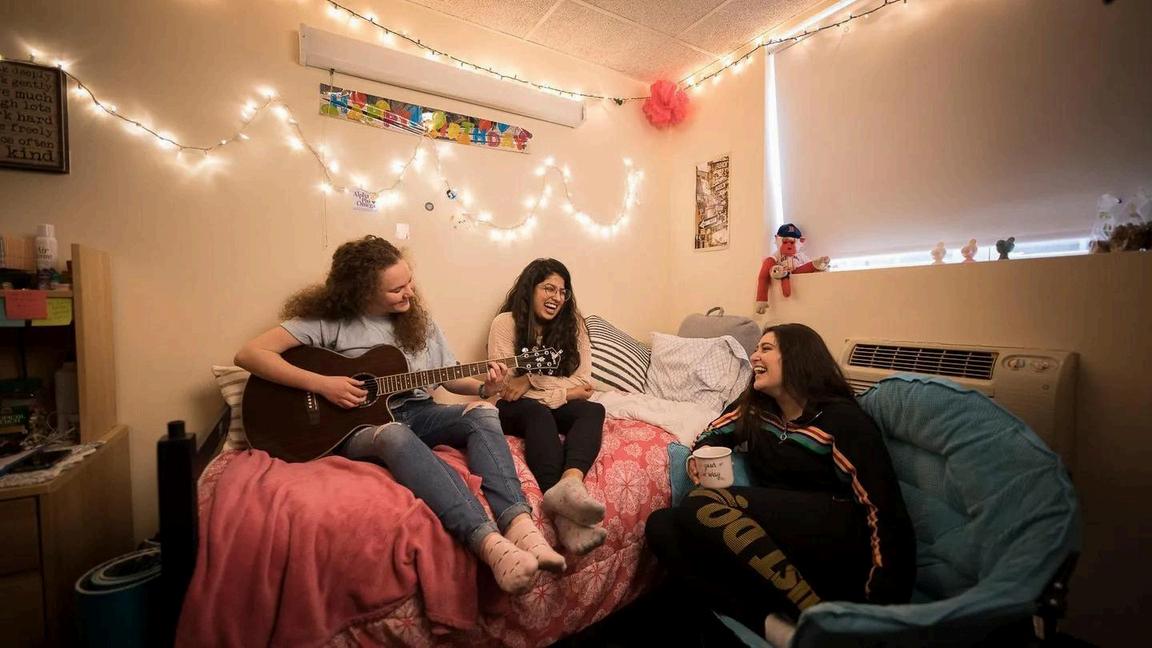
See next page for strategies to help establish a healthy roommate relationship!
Have a conversation about your preferences and expectations. How clean do you like things to be? What temperature works for you? What are your preferences for noise levels, inviting people into your space, quiet hours, etc.
Set clear and respectful boundaries .It may feel awkward at first, but setting clear boundaries from the beginning helps avoid awkwardness and conflict down the line. How do you feel about sharing food, clothes, and other personal belongings? Do you expect your roommate to communicate before bringing someone over?
Outline shared responsibilities so they are split fairly. Whether you're each responsible for your own side of the room, alternating weekly, or another way to split things up, be sure you're on the same page about who is responsible for what.
Respect your roommate's need for privacy and personal space. No matter how close you may become, remember that everybody has their own boundaries and everyone needs some time alone.
Get to know your RA (residential assistants) and Residential Director, and don't be afraid to reach out if you have a question or need some support navigating a situation.
Social conflict is a natural part of life, and doesn’t have to doom your relationships! Still, it can be stressful to address, and may lead to behaviors like avoidance or people pleasing if you’re not prepared with the skills and strategies for effective resolution. Here are some strategies that can help:
Talk face to face. When you’re thinking of how to have challenging conversations, try to talk in person whenever possible - text messages make it difficult to understand tone and can lead to misunderstandings.
Pick a good time and place While it can be tempting to get these conversations over with quickly, avoid forcing a conversation in a public space or at a time when either party is already feeling stressed. Heightened emotions can make respectful communication challenging.
Listen mindfully and actively Avoid multitasking during the conversation and rephrase comments to verify a mutual understanding.
Consider your goals in the conversation. To avoid talking in circles or getting off-topic, remember what your goal is in the conversation. Are you trying to change a specific behavior, preserve your relationship, or express a particular belief or perspective?
1.
Practice compromise. If you both give up a little, you can gain a lot. Better yet, collaborate on a new solution that can satisfy both sides. This approach builds a sense of teamwork and good will.
Give yourself time. Is it important to come up with a solution immediately, or do you have time for the subject to be an ongoing conversation to explore? Don’t pressure yourself to solve everything at once.
Set boundaries. It is important for everyone to feel safe and respected. Be clear about setting boundaries around yelling, swearing, and other things that can get in the way of respectful communication.
remember the following tips to set clear & effective boundaries!
Focus on your behavior. Rather than trying to control the behavior of others, what will you do to enforce the boundary? For example, “If you speak to me with profanity, I will walk away from this conversation.”
2. Practice with small boundaries. If boundary setting is new to you and feels challenging, stretch your comfort zone a bit first with small boundaries, by saying things like “No, thank you,” “I disagree” or “Sorry, I don’t have time today!”
3. Reframe your mindset -- you aren’t being selfish or unkind by establishing boundaries. You’re being kind enough to communicate clearly what would help you and your relationships thrive!
You're out of your comfort zone, getting to know a new community with its own culture. The exciting thing is that this culture evolves every year as new Falcons join the nest – and you’re a part of that evolution! As you participate in new traditions and bring your own to share, you’re contributing to a diverse and dynamic campus. We’re so happy to have you here!
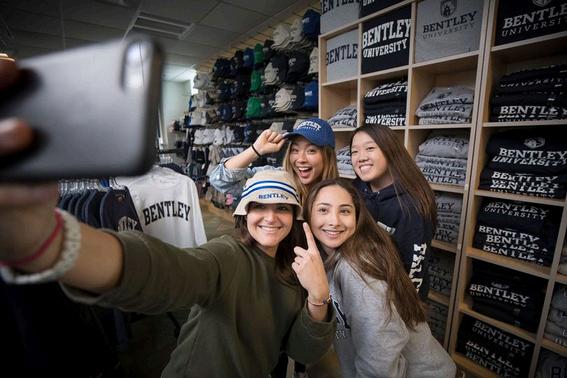
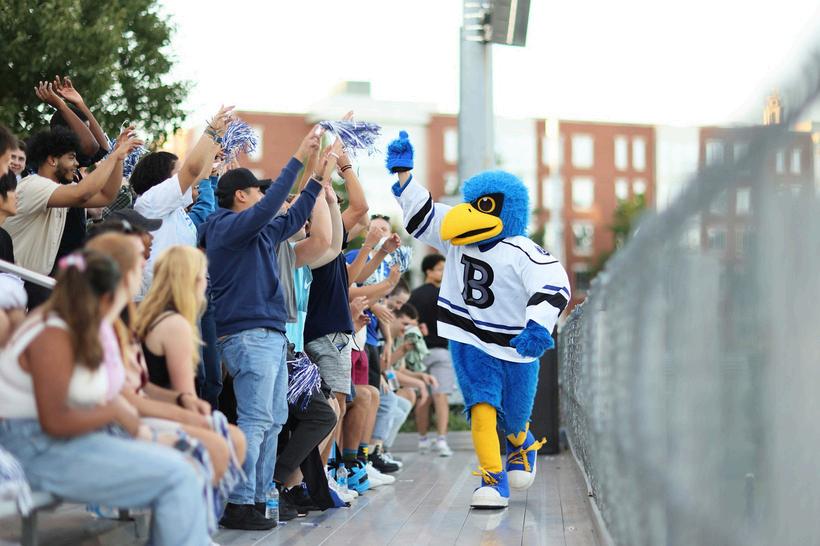
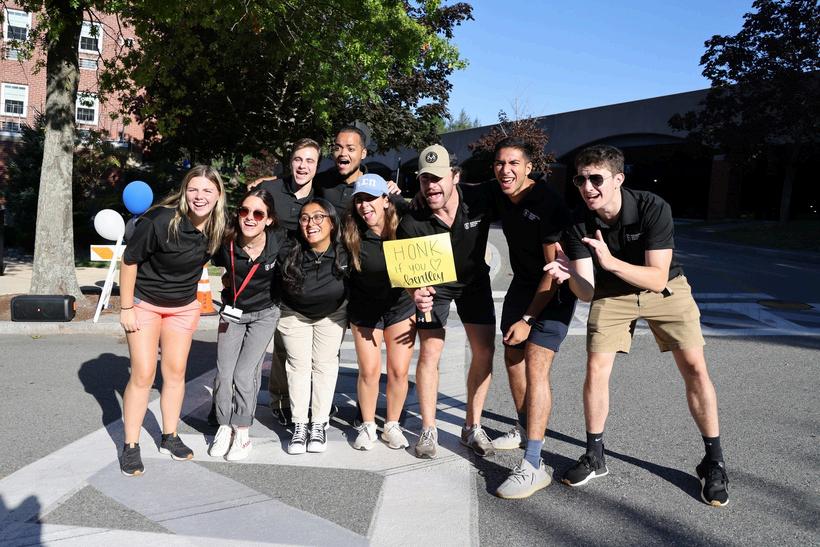
Still, you may experience culture shock -- the process of recognizing, navigating, and adapting to changes when you join a community with social norms, expectations, and traditions different than those you are used to. Some of these differences may be obvious, while others may be more subtle.
You may have these experiences even if you’re not too far from home. While you may not think of the transition to college as entering a new culture, it can bring with it similar changes in our expectations for ourselves and others, overall lifestyle, social norms, ways of communicating, and more.
The good news is, you’re not alone in this experience. Researchers have found a predictable pattern of stages that occur when a person experiences culture shock -- and it applies to first year college students, too!
If you feel like you’re struggling to adjust, know that it’s completely normal, and the feeling doesn’t last forever. Here’s a general idea of what you may experience:
Acceptance & Integration
This stage might start before you even arrive on campus! The overall feelings are generally excitement and positive anticipation, sometimes with some feelings of homesickness mixed in. Overall, this is a time marked by the energy of new beginnings.
continued on next page
Honeymoon Culture shock Initial adjustment Mental isolationAt this point, the excitement begins to wear off and you may become more aware of the challenges you face as you navigate your new community. You may experience greater stress, anxiety, and homesickness. It is a time of greater challenge, and also greater growth as you learn new skills.
The initial adjustment phase will happen when you learn new ways to manage the challenges that have come your way. You’ll experience greater confidence as you settle into your routines and establish a sense of normalcy in your new lifestyle. Challenging situations will still come and go, but you’ll be better able to manage them.
At this point, you may feel “caught between worlds” as you compare your new life with your old one. Campus may not feel quite as comfortable as home, while home may not feel as familiar as it once did. You may be noticing personal change in your values and beliefs, and waves of homesickness may return.
Eventually, you will reach a level of comfort and will be able to understand the social nuances of your new community. Your routines will feel more natural, and you’ll have gained new friends, hobbies, and goals that become a part of your daily life. You’ll feel a stronger connection to the campus community and have a more balanced view of the benefits and challenges.
As exciting as it can be to embrace your independence at college, homesickness is also common and can happen at any point throughout the college experience. As you start to settle in and explore your new campus and community, here are some tips for managing homesickness:
Remember that you’re not alone - Our brains are wired to take comfort in the familiar. When we’re faced with a big change like the transition to college, a period of adjustment is completely normal! There are plenty of other students who don’t know anyone else and are eager to get to know their new community -- take advantage of this opportunity and reach out to other students to explore together!
Keep your comfort ItemsIf you have a favorite stuffed animal, blanket, photos, or food items that bring you comfort and remind you of home, they can be great tools to support you when you’re missing home.
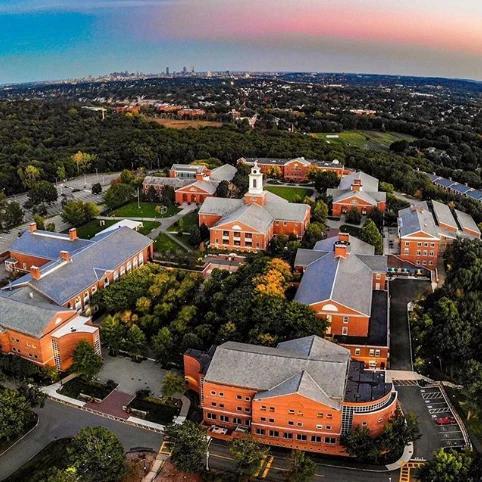
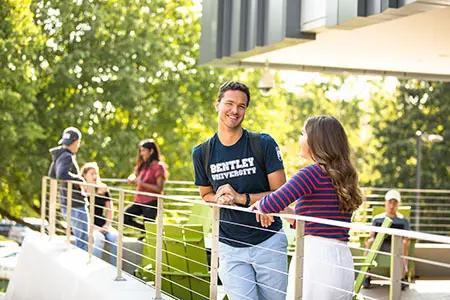
Get into a routine - There’s no quick fix to homesickness, but staying busy and establishing new routines can help you start to feel more settled into your new lifestyle. Join some student groups, establish an exercise routine, look for student employment or volunteer work, and take advantage of other opportunities to fill your time with things that bring you joy, comfort, and connection.
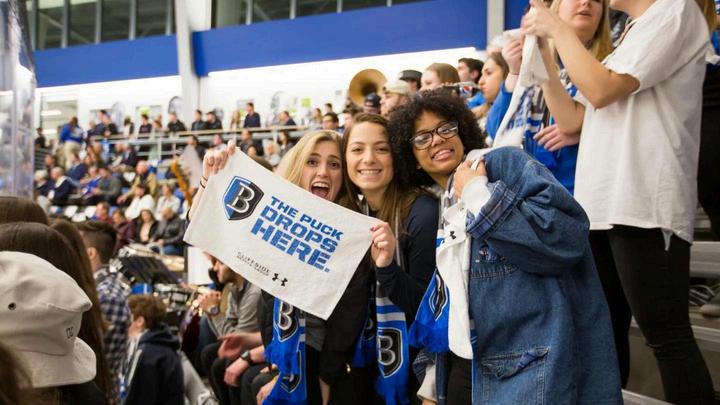
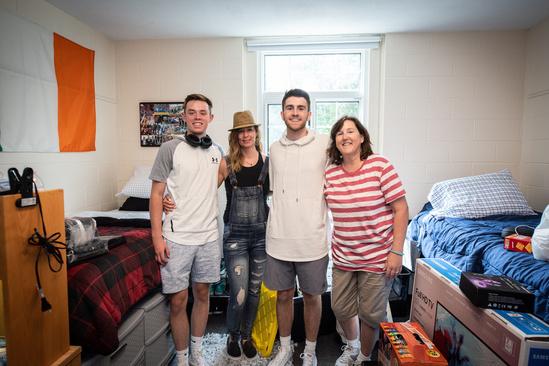

Share your traditions - Did you have any favorite traditions at home, such as Friday night movie night, a special weekend breakfast, or other activities? What about cultural traditions, like Lunar New Years? If possible, share them with your roommate and other friends and enjoy them again in your new community.
Avoid over-connecting with home -It’s a great idea to keep in touch with phone calls and social media, and even visiting home every so often. It can be tempting to call and return home all the time when you’re feeling anxious and want to be surrounded by something familiar. Remember that things at Bentley will eventually start to feel familiar, too. The sooner you get out of your dorm room, connect with other students, and establish new routines, the sooner that will happen.
As exciting as this is, you might feel stress or anxiety as you navigate unfamiliar places and expectations. It’s not always comfortable being away from familiar people and places. See below for resources that can help you feel at home at Bentley
The Multicultural Center is the campus hub for resources and programs to support diversity and inclusion. This center hosts dialogue groups that will support you as you explore your social identity
The international presence at Bentley is growing every year CISS is here to support you in your transition to living in the US, and to provide opportunities to celebrate the diverse cultures that make Bentley special.
Our campus is home to students from around the world, representing many faiths and worldviews. The Spiritual Life community offers worship services and meditations on campus several times a week, as well as non-religious programs to support your spiritual journey.
GSSP provides a welcoming environment for students to engage with topics of gender & sexuality. Offerings include educational programs, dialogues, and workshops, an LGBTQ+ mentoring program, and other resources to explore the intersection of gender, sexuality, and other dimensions of identity.
The transition to college can bring stress for any student, and there may be added challenges for those who can’t draw upon the experience of caregivers who have already been through it. First Gen students bring a lot of unique skills & are strong self-advocates. Bentley offers the following resources to support students in finetuning their skills and navigating university policies and procedures.
The Student Success and First Generation Coordinator helps First Gen students get connected to campus resources, guides them through university policies and procedures, and offers programs for the First Generation students.
This community is made up of students who are the first in their family to attend college Students in this community serve as a social support network for each other, participate in floor programs, and interact with faculty and staff to enhance their sense of belonging at Bentley.
As part of Bentley’s commitment to supporting first-generation students both in and out of the classroom, we have compiled a list of faculty and staff who are the first in their families to go to college
For more information about resources and programs for first generation students, please contact FirstFalcons@bentley.edu
Fueling our bodies well helps us perform well academically! It doesn’t need to be complicated – if you’re new to managing your own diet, meal planning, shopping, or cooking, start by focusing on the 3 foundational elements of good nutrition: adequacy (eating enough), balance (of proteins, fats, and carbohydrates) and variety (to get a wide variety of nutrients!)
To make sure you’re eating enough, plan for a meal or snack every 3-5 hours Remember that it’s normal for hunger levels to change every day depending on activity levels, hormonal changes, and a variety of other factors. If you have extra activities planned that might require a bit more fuel, keep your backpack stocked with easy, portable snacks.
Pairing proteins, fats, and fibers at most meals and snacks helps to ensure that your body gets the major nutritional building blocks it needs, and also helps keep mood and energy levels stable Carbs are your body’s main source of energy, and proteins, fats, and fiber can help slow digestion and keep you feeling full for longer.
A simple trick for getting a variety of nutrients is building a colorful plate – foods of similar colors tend to signal similar nutrients, so aiming to “eat the rainbow” can help to make sure you’re meeting all your body’s needs.

Check out these locations around campus for a wide variety of options to meet your needs and preferences

Currito – located in the Dana Center | Burritos, Bowls, Salads, and Smoothies
Einstein Bros Bagels – located in the Library | Bagels, Breakfast sandwiches, Lunch sandwiches, Coffee, & more
Starbucks Express -- located inside LaCava Café | Coffee, espresso-based beverages, hot and iced teas, breakfast pastries, breakfast sandwiches, salads, and deli sandwiches
LaCava Café – located in LaCava at the top of the hill | home-style entrees, pizza and pasta, Hissho Sushi, made-to-order grill, soup, deli, and salad favorites
Dunkin – located in the Student Center second floor | Coffee, Donuts, Breakfast Sandwiches, other beverages, & more
921 – located in the Student Center second floor | all you can eat, including offers that are plantbased, vegan, allergy and kosher friendly
Harry’s – located in the Student Center second floor | flatbreads, sandwiches, and appetizers like wings and mozzarella sticks
Natural! – located in the Student Center third floor | fresh-squeezed fruit juices and blended smoothies
Falcon Mart – located in Collins Hall first floor | grab your favorite treats, beverages, grab n' go meals, and ice cream!
The Falcon Family Fridge is Bentley's version of a Community Fridge. The concept is simple - anyone in the community can donate food, and anyone in the community can take food We operate by the principle: "Take what you need, leave what you can "
Located outside Jenison, on the lowest level on the corner with Smith, the Falcon Family Fridge is a freestanding outdoor structure with shelves for large plastic bins to hold dry goods, and it also contains a full fridge for perishable goods. It's located near a shuttle stop and close to the 15-minute parking spots for convenience.
Swipe out Hunger is a confidential resource for Bentley students experiencing food insecurity. Students interested in requesting meal swipes can submit an application form, and upon approval, the requested number of swipes will be added to the student ID The Swipe out hunger program application is active from the second week of the semester until the end of finals week each semester.
With all the new opportunities to explore, it’s easy to forget that rest is essential for learning, memory, and more! Quality sleep (about 7-9 hours per night) supports problem solving, mental focus, creativity, and motivation – all important skills to support your education at Bentley!
Lack of sleep harms emotional regulation, impulse control, and our immune systems, making it more challenging to get to know new people, navigate new schedules and expectations, and stay healthy. These effects make it difficult to perform your best in social situations and academic work.
Your sleep habits might change as a result of having a roommate, adjusting to your new schedule and environment, and managing new responsibilities Take a look at the tips on the next page for strategies that support a good night’s sleep, or contact thrive@bentley.edu to ask about our sleep coaching program!

Maintain a consistent sleep/wake schedule
In order to get your needed 7-9 hours of sleep each night, aim to go to bed 8-9 hours before you need to be awake. Try to stay consistent (even on weekends!) to strengthen your circadian rhythm.
Create a relaxing bedtime routine
To help yourself wind down after a long day, turn off screens at least 30 minutes prior to sleep and build a routine of calming activities, like a warm bath, reading, journaling, or listening to soothing music.
Cultivate an environment that promotes sleep
Keep your lights dimmed or completely off, and turn off any technology or screens. Cooler air temperatures and white noise machines also promote sleep!
Reserve your bed for sleep
Help your brain build the association that the bed is for sleep If you’re having trouble falling asleep, get out of bed to do a relaxing activity until you do feel tired.
Limit alcohol, caffeine, nicotine, and marijuana close to bedtime.
These substances inhibit your abilities to fall asleep, stay asleep, and achieve deep, restorative sleep.
Master the art of napping
Short power naps of about 20-30 minutes in the afternoon can be helpful -- but try not to nap any later than 3 pm. Longer naps or those taken late in the day prevent you from getting sleep at bedtime.
Exercise regularly, but not right before bed.
Regular exercise promotes sleep, but physical activity too close to bedtime can release endorphins and increase body temperature, preventing you from falling asleep!
Among the endless benefits of exercise, regular physical activity improves mood, boosts energy, and promotes quality sleep and social engagement It’s a great tool for supporting yourself in a new environment and community Whether or not you consider yourself an athlete or envision yourself in the gym, there are numerous opportunities around campus to support an active lifestyle, in or out of the gym.
7:00 a.m.11:00 p.m.
7:00 a.m.11:00 p.m.
7:00 a.m.11:00 p.m.
7:00 a.m.11:00 p.m.
7:00 a.m. -
7:00 p.m.
10:00 a.m.6:00 p.m.
10:00 a.m.11:00 p.m.
Schedules are adjusted during breaks and holidays – see the Dana Center website to learn more
Located in the lower level of Slade Hall, this space features mirrored walls, wood floors and a TV/Blu-ray player. Yoga equipment, Pilates rings and resistance bands are available for personal fitness. This space also features weekly fitness classes – check the @bentleyrecreation Instagram accounts for updates and schedules!
Intramural Sports Teams are a low-pressure option for more casual and affordable games and are flexible for students who are short on time, working with a low budget, or looking for ways to increase enjoyment of exercise.
Men's soccer
Coed soccer
Flag Football
Ultimate Frisbee
Men's A League Basketball
Men's B League Basketball
Women's Basketball
Coed Volleyball
Club Sports are one step up from intramurals. They can be a bit more competitive and may require tryouts to join.
Club Hockey
Bentley Dance Team
Equestrian Team
Falcon Cheerleaders
Bentley Triathalon
Club Volleyball
Men's Rugby
Men's Ultimate Society
Sailing Club
Women's Ice Hockey
Women's Rugby
Women's Ultimate Society
Bentley also has a number of other student organizations focused on physical activity, without being considered a competitive sport.
BEAR Outdoors Club
Bentley Ballroom
Bentley Dance Team
Irish Dance Club
Racquet Sports Club
Bentley Skating Club
Climbing Club
CRAZE
Ski/Snowboard Club
Spikeball Club


1 SERVING PER DAY
AMOUNT PER SERVING 100
hours
30 minutes
Every body is different, so move in a way that works for yours. 10 minute increments are great for study breaks. Meals
3 daily
Aim to eat protein and healthy fats to stay full. High quality fiber, rich carbohydrates, and fruits supply your brain with the sugar it needs to study!
Try to take 10-15 minute breaks between study sessions to refuel and relax. This may help you refocus and continue.
Speak words of affirmation to yourself to help keep spirits up. You can keep doing difficult things. You've got this.
Wellbeing . Counseling . Health Center

There are numerous outdoor spaces at and around Bentley for walking, running, hiking, biking, and more!
Bentley’s Track is located on lower campus, just past the baseball field and Arena
Outdoor basketball courts are located by the Trees and Copley residence halls on lower campus
Beach volleyball courts are located behind Forest and Kresge halls, next to the Student Center
Walking Trails/Hiking:
Woodland Trails at Stonehurst – located at the corner of Beaver and Forest Streets, a 10-minute walk from lower campus, this is a 109 Acre park with walking trails
Veteran’s Field in Waltham – located at the corner of Forest Street and Harrington Road, a 20-minute walk from Rauch Administration Center, this is a walking loop around turf soccer fields

Adjusting to campus takes time – finding your classes, navigating the shuttle system, and finding your favorite place to stop for lunch are some of the first steps to making Bentley your new home Whether you want to explore your new home on foot or by bus, the map and shuttle schedule below will help you find your way around.
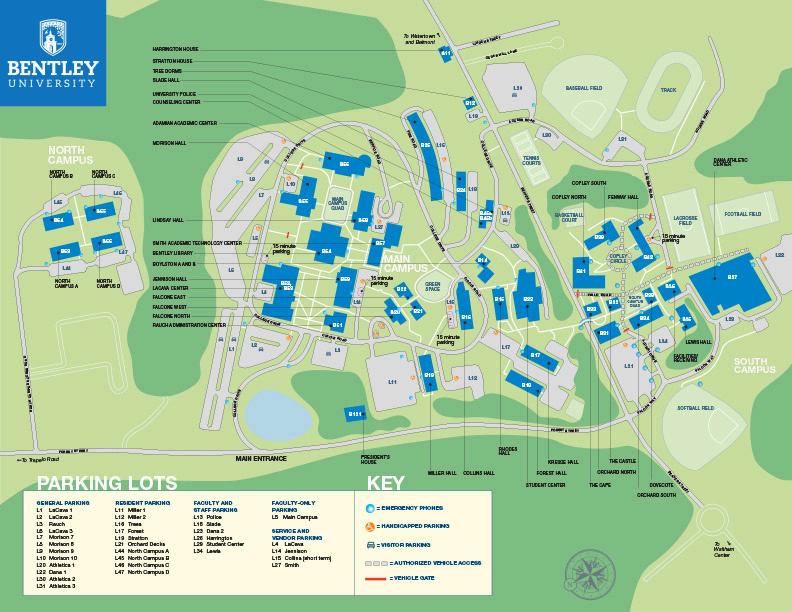
The Bentley Shuttles are a free resource for exploring the local area, as well as getting around campus. With three routes that cover campus, Waltham, Waverly Square (Belmont) and Harvard Square (Cambridge), you also have easy access to MBTA buses, subway, and commuter rail lines.
The Transloc shuttle app can be downloaded on Apple and Android devices and provides live tracking, bus capacity, and arrival times, as well as important schedule updates
Bentley University strives to make the shuttle accessible to all users. If you are having difficulty accessing them and need an accommodation, please contact Procurement and Campus Services at SM Campusservices@bentley.edu.
Nervous about finding your classrooms and getting there on time? Try some of these tips to help you feel more confident in showing up to the right place at the right time:
Practice walking the route and finding your classrooms before the first day of class. Take note of how long it takes you to get from place to place.
Give yourself a little extra time to get there in the first couple of weeks – with time, it’ll start to feel automatic, but you’ll feel less anxious about getting lost if you’ve already given yourself some wiggle room.
Set your schedule as your phone background, or keep it in your notes app, along with a map of campus. This way, you’ll have the information easily accessible if you ever need to double check.
Managing money may be a new skill you’re developing as you enjoy new freedom and independence around your spending habits. Balancing tuition, loans, school supplies, necessities, and just-for-fun spending can be tough, especially when you’re juggling so much else!
Get a clear idea of how your money is being spent. Track your spending during your first few weeks at college to account for school supplies, food, medication, personal hygiene products, phone bills, gas, social spending, and however much “wiggle room” you’d like in your budget to feel comfortable Remember that you may need to account for purchases you never had to make before coming to college, and things can add up quickly!
Set Financial Boundaries. Bentley students come from a variety of backgrounds, with different spending habits and priorities around money. Take some time to sit down and make your budget based on your own resources and preferences. Don’t let yourself overspend with friends who have different financial habits! Be clear about expectations regarding splitting bills, sharing resources like groceries, and other choices that might impact your spending 1 2 3
Check to see if companies offer student discounts before making purchases! Student IDs and email addresses can sometimes be used for discounts on purchases, reduced cost of entry, or other benefits
The Student Hardship Fund is a resource for students experiencing unforeseen financial difficulties that jeopardizes the student's ability to successfully continue in school Students can receive up to 500 dollars.
Give 'N Go is Bentley's sustainable move out program that reduces students' expenses by allowing them to take items that are donated to be reused These include clothing, bedding, furniture, food, school supplies, kitchen items, books, electronics, toiletries, laundry detergent, and cleaning supplies
Miss Major’s Closet was created with the intention to provide gender affirming clothing for transgender and gender nonconforming students This closet is a free resource for clothing, shoes, and accessories. The closet is located in the Gender and Sexuality Student Lounge (GSSL) in the Student Center
The Career Center Closet provides students access to FREE professional attire appropriate for career fairs, interviews, networking events, classroom presentations and the workplace. The closet is located within the Undergraduate Career Development Center in LaCava 225 and is open 1 – 3pm, Monday – Friday.
Bentley Library Discounts The Bentley Library offers free or discounted tickets to numerous local museums to enjoy the art, culture, and history of the area at more affordable rates. Museum passes must be booked online. A valid Bentley ID is required to reserve passes and to pick them up at the Library Services desk.
Federal Work Study does not guarantee that you will be able to obtain employment on campus but gives you the opportunity to apply for jobs on campus. Many positions fill quickly, so start your job search process early.
Employment listings are updated regularly and separated for graduate and undergraduate positions.
Students may apply for these positions through Workday and may be required to complete an I-9 form once accepted.


Go to Workday

Log in with your Bentley email and password

Go to "Student Employment" & specify if you‘re looking for undergraduate or graduate level jobs

Student Worker positions are also available at all dining locations across campus. If interested, please email GA BentleyDining@bentley.edu
To work on campus, you must first secure a position on campus, then obtain a Social Security Number (SSN) from the Social Security Office and submit the proper paperwork to the Student Employment and Financial Aid offices.
Please see here for more information on employment for International Students.

Bentley mail services provides service to all students living on campus. The mail center is open Monday through Friday from 8 am to 6 pm during the academic year (September - May). Over the summer, the mail center closes at 5 pm. Mail services are closed on all University Holidays and instances of severe weather.
Student mailboxes are located on the ground floor of Collins Hall. Stamps can be purchased at the Bentley Bookstore in Collins Hall. Postage for USPS packages and or larger mail items can be purchased at Mail Services by using Falcon Funds on your Campus ID
Students will receive email notification from Bentley Mail Services (GA mailstop@bentley.edu) when their package is available for pick up. Emails or delivery notifications from other sources including the sender does not indicate that your package has arrived on campus or that processing has been completed and ready for pick up.
To pick up a package, an individual must present a Bentley student ID or other clear and legible photo ID (license, passport, etc.) at Mail Services. Package recipients will be asked to sign for all packages upon receipt.
Laundry is one of those unavoidable weekly chores, but it doesn’t have to be a hassle. Laundry machines are located in each residence hall, and payments can be made with debit or credit card on your phone using the “Laundry Connect Pay” app. Machine numbers or QR codes can be used to start the load once payments are made

Taking proper care of your laundry helps them last longer, supporting sustainable practices and reducing the cost of replacement items and repairs.
It is safe to wash in a machine at the appropriate temperature and cycle (indicated by other symbols)
Wash by hand instead of in a machine. Typically for delicate materials such as linen and silk.
Take these items to a professional dry cleaner rather than washing them with a machine or by hand.
Take these items to a professional dry cleaner for the removal of dirt or stains.
This item can go into your dryer, but may require additional attention to heat settings to minimize damage to your clothing
This item should not go into your dryer, but can be hung up on a clothesline or laid flat to dry
This item should be laid flat to dry, rather than hanging on a clothesline, in order to avoid stretching or damaging the fabric.
See other symbols you don’t recognize? See here for more information!
Addressing health concerns quickly is essential for maintaining good health. The University Health Center is located across from the second floor entrance to the Student Center (across from Dunkin Donuts!)
The Health Center is open from Monday to Friday from 8:30 a.m. to 4:00 p.m.
Diagnosis and treatment of medical illness or injury
Routine healthcare visits
Lab testing and prescriptions
Sexual and reproductive
healthcare: emergency contraception, STI Testing, PrEP
Nutrition coaching
Gender affirming care & hormone therapy
Assistance getting connected with off-campus providers and specialists
Most services are covered in the cost of tuition. Lab testing will be billed to insurance.
To schedule a visit, call the health center at 781-891-2222 or log into the Bentley Health Portal to see self-scheduling options!
Health insurance is a contract that requires an insurer to pay some or all of an individual’s healthcare costs.
All students enrolled at least 3/4 time are required by Massachusetts State law to enroll in the Student Health Insurance or be covered by a health insurance plan with comparable coverage.
All international students will be automatically enrolled in the student health insurance plan and do not need to take any action
If you are covered by a comprehensive health insurance plan you can opt out of the Bentley University plan by completing the waiver form.
Students who do not submit an enrollment or waiver form by the deadline will be enrolled in the student health insurance plan automatically and responsible for the insurance premium.
Bentley has partnered with University Health Plans to administer the plan and help with waiver, enrollment, or benefit-related questions.
University Health Plans can be reached at 833-251-1738 or info@univhealthplans.com.
Your premium is the amount you pay for your insurance policy.
This is the amount of money you must pay before your insurance starts to cover your expenses.
This is the percent coverage you will still be responsible for after hitting your deductible.
This is the set dollar amount you will still be responsible for after hitting your deductible.
This is the list of doctors and healthcare providers that your insurance policy contracts with to provide medical care.
Click here for more information about Bentley's Student Health Insurance Plan
Taking care of your mental health is an important part of maintaining wellbeing – and it’s not just for those with a diagnosed mental health problem or illness. Mental health consists of three main components:
these are the methods a person uses to regulate their emotions and manage stressful situations
these are our abilities to pay attention, remember and organize information, solve problems, and make decisions
these are what strengthen our ability to empathize, communicate, and interact with others verbally and non-verbally
As you can see, mental health influences a number of skills that are essential for navigating a new community, challenges, and expectations of college life.
If you need support in strengthening these skills or navigating concerns that are impacting your mental health, Bentley has resources to support you.
There are many challenges that come from transitioning to college, each of which can impact mental health and wellbeing. Having the skills to recognize signs of distress in yourself and others helps prepare you to respond appropriately and access support.

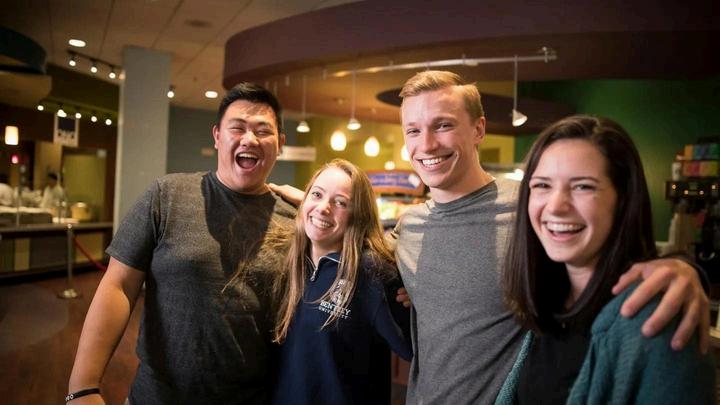
To learn more about the psychological, physical, and behavioral signs of distress and strategies for having difficult discussions, head to bentley kognito com and log in with your Bentley email and log in information.
Kognito is a 20 minute online course and role play simulation that helps you recognize the signs of distress and gain confidence in knowing how to reach out to friends who may be struggling.

Click here to try Kognito!
We understand that our students may experience a variety of academic and personal challenges during their time at Bentley The Care Team, a small group of staff members from Student Affairs and Academic Services, works collaboratively with partners across campus to follow up with students who may benefit from support to connect them with the resources or services they need.
Students, Faculty, Staff, families, and all members of the Bentley community are encouraged to learn the signs of distress and intervention strategies For nonurgent concerns that you are unsure how to navigate, you can get help from the CARE Team.
Bentley community members can submit a CARE Referral, an online form submitted to the CARE Team on behalf of a Bentley Student who may benefit from support in accessing resources.
The CARE Team will initiate a review process and coordinate a response with the appropriate offices and staff to support the student of concern A member of the Care Team will typically follow up with you within 1-2 business days and will coordinate any outreach to the student of concern as appropriate.
Some level of stress is a natural part of life, and can be expected when getting adjusted to the college lifestyle. Keep in mind that struggling isn’t a sign of weakness or failure -- In fact, it’s usually the first phase of developing new strengths and strategies! Developing a sense of independence happens gradually over time as you learn to manage more responsibilities little by little.
While it’s completely normal to experience stress, you may benefit from additional support if you begin to feel overwhelmed. There are countless resources available through the Counseling Center and the office of Community Wellbeing and Health Promotion to teach you new tools and techniques for managing stress.

Coping refers to the efforts to manage a stressful situation. There are two main types: problem focused and emotion focused.
Problem focused coping is when the stressor itself is addressed. You may evaluate the situation as changeable and create a plan for improving things.
Remember that even when a stressor is in your control, problem solving can be difficult when your body is dysregulated.
If you need techniques for calming your body before you’re able to tackle the problem, please see the page 49 for stress reduction and grounding techniques.
Some of the things that cause us stress are not within our control or are chronic stressors. These require emotionfocused coping.
In these situations, the goal is to accept and work with the reality of the situation and to seek comfort through a variety of outlets, such as creative expression, talking to loved ones, spirituality, time in nature, and more
Stress reduction techniques can be used to help regulate and calm the body and reduce symptoms of stress. Problem solving is difficult in fight or flight mode, so using these strategies first can help you tackle challenges more effectively.

These exercises guide you through the body one muscle group at a time, allowing you to notice any tension you may be holding and then releasing it. Progressive Muscle Relaxation exercises can be found on YouTube and meditation apps such as Insight Timer, Headspace, Calm, and more.
Breathwork is a controlled breathing practice that can be used to help process and regulate emotions and reduce stress in the body.
Box breathing is a simple technique that can help you to slow your breath. Visualize a square in your mind and trace the sides slowly as you inhale, hold, and exhale to equal counts of four
3. Exhale for four seconds
4 Hold for four seconds
5 Repeat as desired
This technique helps to slow the pace of your breathing by having you apply more effort to each breath.
Relax your neck and shoulders 1. Keep your mouth closed and inhale slowly through your nose for 2 seconds. 2. Purse your lips as if you’re about to whistle. 3. Exhale slowly through your pursed lips for 4 seconds. 4. inhale exhale hold hold Inhale for four seconds 1. 2. Hold for four seconds
Grounding techniques can be used to help manage excessive worrying and racing thoughts by turning attention away from stressors and refocusing on the present moment. Below are three simple grounding techniques that you can use in those moments.
Take a deep breath and pause for a minute to take in your environment. See if you can find:
5 things you see
4 things you can touch
3 things you hear
2 things you smell
1 thing you taste
Take a minute to look around you and find an object you’re drawn to for each color of the rainbow
Take a minute to look around you and find an object you’re drawn to for each letter of the alphabet.
The Counseling Center is available for all students who are struggling and seeking mental health support. The Counseling Center staff are available for an initial consultation, which will be used to assess and determine the best course of action to help a student. If appropriate, staff can schedule students for short-term therapy.
In addition to counseling with a Bentley Clinician, the following resources & services are offered for students needing informal or after-hours support, off-campus referrals, teletherapy, or counseling in other languages.
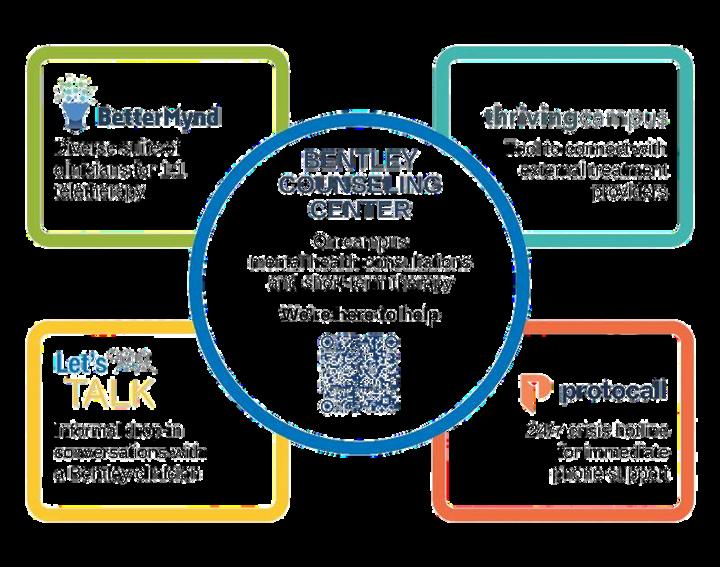
The Counseling Center is located in the Callahan building above the University Police and is open from Monday to Friday from 8:30 am - 11:45 am and 12:45 pm - 4:30 pm.
Call the Counseling center at (781) 891-2274 to schedule a visit, or schedule online through the consultation self-scheduler
While the Health center and Counseling center provide clinical services and care for physical health and mental health, Community wellbeing is your stop for skill building, health education and coaching, and wellbeing resources.

Customize wellbeing programs for your clubs, residents, or other student groups!
Get help identifying & accessing resources and programs that support your wellbeing goals.
Attend programs & events around campus with education & skill-building around various topics:
bystander intervention
sleep quality
stress & resilience
sexual health
safer substance use
healthy relationships
mental health
Access educational materials to help you learn new skills!
Want to learn more? Visit our website, follow on instagram @bentley health, or reach out to us at thrive@bentley.edu
The Bentley community is made up of people from all over the world and raised with diverse cultural values, beliefs, and attitudes. We recognize that not everyone has had the same access to information or opportunities to talk about sexual health with their family members or peers prior to arriving at Bentley and we want to do our part to bridge those gaps. Whether you are currently sexually active, have never had sex before, or are not interested in sex at all, Bentley has resources for everyone.
The comprehensive Sexual Health Guide is a personalized guide to sexual healthcare created for Bentley Students and includes information on contraception, STIs, consent, safer sex supplies, and more.
STI testing is an important part of taking care of your sexual health. Most people will be asymptomatic, or experience little to no symptoms. This is what can make STIs (Sexually transmitted infection) spread easily because people may be infected and not even know it! The Health Center offers STI testing through appointments and the STI express clinic billed to your insurance.
In an effort to minimize barriers to access for resources such as safer sex supplies and menstrual products, Bentley has numerous locations around campus where these products are available to students at no cost.
Menstrual hygiene products can be found across campus in public restrooms, including gender neutral bathrooms.
Safer sex supplies such as condoms can be found at the Health Center, along with educational resources and health screenings.
The Office of Community Wellbeing and Health Promotion also distributes safer sex kits through their “Falc Yeah” program, offering products such as internal and external condoms, lube, dental dams, and more. Keep an eye on their Instagram account, @bentley health for more information about when these kits are available.
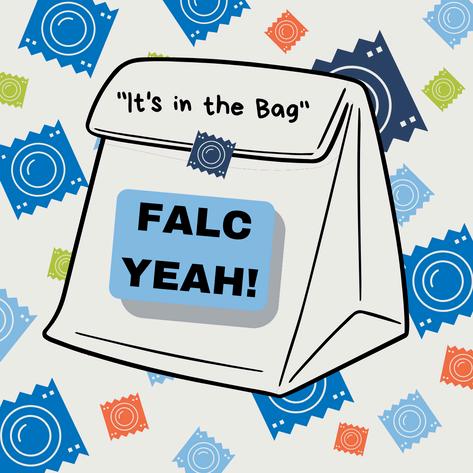
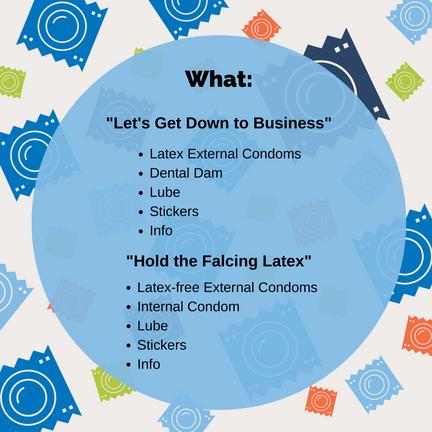
Everybody deserves to feel safe and respected in their community. If you have ever experienced sexual assault, relationship violence, or stalking, it is not your fault. No matter what resources or actions you choose to pursue, there are many people at Bentley committed to help.
Confidential employees are staff members who can assist students with identifying resources and options for reporting, follow up care, and supportive measures. Disclosures to these employees will not initiate an investigation into an incident against your wishes, giving you control to make the best decision for you and your care.
Identifiable information like your name, class year, and residence hall are never shared so your identity is protected unless you choose to make a formal report to campus.
On campus confidential resources:
Counseling Center
Health Center
Community Wellbeing & Health Promotion
Spiritual Life Center
Ombuds Office
Click here for more support resources
You can reach out to these resources at any point. If you are looking for immediate resources such as treatment for injuries, emergency contraception, STI testing, evidence collection, or more, please see here for more options.
It
Options
Reporting
Reporting
Reporting
File
Delayed
Bentley University Police plays a critical role in keeping our campus safe. They are a full service law enforcement agency certified by the Massachusetts State Police and are open 24 hours per day, seven days per week, yearround.
In cases of emergency, please call the emergency Line at 781.891.3131.
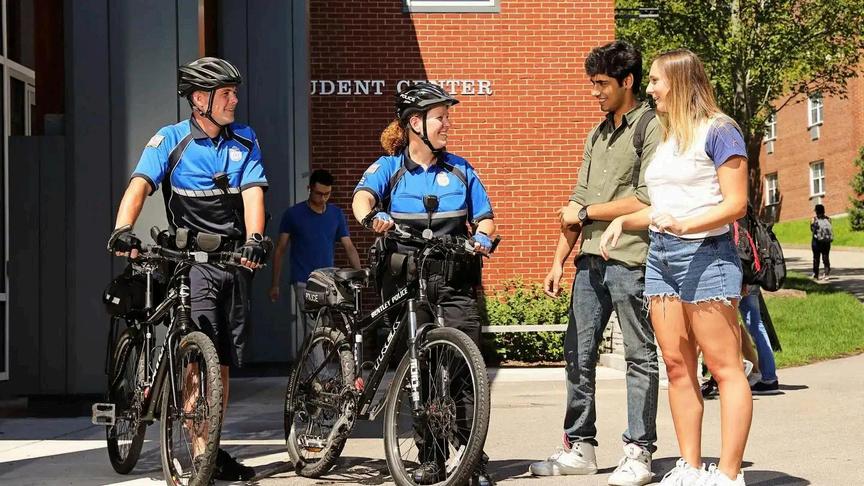
The RAVE Guardian app is available for all Bentley community members to provide you with quick and easy access to Bentley University Police Department and other resources.
Features include: Emergency call button to connect with University Police Call Directory for offices and resources to support survivors
Access to campus safety reports, CARE Team, Title IX, and the student handbook Safety Timer features Chat feature (anonymous) for reporting concerns and suspicious activity

For more information and how to access, scan here
Coming to college may or may not be your first introduction to alcohol and other substances Either way, you’re entering a new community with different expectations, trends, and preferences around the way that they’re used Here’s some information on safer substance use to help you make the best choice for yourself.

The legal drinking age in the United States is 21 years old.
Alcohol decreases sleep quality by interfering with your body’s natural sleep cycle. Deep sleep is important for memory storage and recall, and will help you feel refreshed and prepared for classes.
One heavy night of drinking can impact brain function for up to 3 days! That means that even if you drink on Friday night, you could still be impacted on Monday.
Binge drinking is associated with lower GPA -Research shows that students who had 6 standard drinks just one night per week had GPAs .11 lower than those who chose to drink less.
When alcohol leaves your system, it depletes your levels of serotonin, the chemical that regulates mood – this can lead to greater stress and anxiety after drinking.
Making the choice not to drink in college is more common than you’d think! No matter what your goals may be, if you’re struggling to navigate a new drinking culture, here are some things to consider:
You don't have to drink in college. In fact, not as many people are drinking as you might think. 1/3 of Bentley students choose not to drink alcohol. There are plenty of ways to be social and have fun without drinking. Check out student events around campus, host a game night or movie night, or explore other hobbies.
Remember it‘s your choice. There are plenty of reasons why students choose not to drink, and they’re likely different for everyone! Whether you’re focused on your spirituality, health, academics, personal preference, or any other factors, remind yourself of what you’re gaining by making that choice.
There are resources to support you. If you’re interested in more resources on safer substance use or sobriety/recovery as a college student, please see below:
Confidential consultations via our B.A.S.I.C.S. program and cessation services are available to students.
We can also assist with connecting students to off campus resources such as local support groups and other community resources.
Build out your stress-relief toolbox. Remember that using alcohol and other substances to manage emotions can prevent you from learning more supportive strategies for responding to challenging situations.
Stay Hydrated. Alternate between alcoholic and non-alcoholic drinks throughout the night.
Eat before or while you are drinking.
Avoid mixing alcohol with other drugs, including caffeine in energy drinks or other beverages
Know the Signs of Alcohol Poisoning:
C – cold, clammy, or pale skin, bluish lips
U – unconsciousness, can’t be woken up
S – slowed or irregular breathing
P – puking while passed out
S – seizing
If you witness someone experiencing these symptoms, call University Police immediately at 781-891-3131.
Under the University’s Medical Assistance Policy, any student who requests help from a university official for themselves or another student will not be charged through our conduct system for alcohol policy violations. Click the image to the right for more information.
Stick to standard drinks like beer or hard seltzers, as opposed to mixed drinks which have unclear amounts of alcohol.
If y are sta
12 oz = 1
5 oz = 1 glass of wine
1.5 oz = 1 serving of liquor

Se a bit longer for women to process alcohol. Help yourself stick to your limits by carrying only enough money to pay for a certain number of drinks, or bringing a set number of drinks with you. Track your consumption using the notes app or another app on your phone.
Keep track of your drink – if you put it down, leave it unattended, or misplace it, get yourself a new one
Independence is not an all or nothing thing. Being independent and mature also means knowing when to get support or work as a team.
Not sure where to start? The screening tools below can help you can a better understanding of what you’re experiencing and direct you to the most appropriate resources.
Still unsure what might be the best fit for you? Reach out to the office of Community Wellbeing and Health Promotion for more support getting connected to resources and services that fit your needs.
This resource offers anonymous online screening tools for Anxiety, Depression, Eating Disorders, and Substance Misuse that you can take for yourself or a friend.
Community Wellbeing & Health Promotion offers eCheckup to go screening tools for both alcohol and cannabis use. These tools help you to take a closer look at your patterns of substance use, risk factors, and overall goals and offers helpful resources at Bentley.
Navigating college classes and expectations requires different skills and responsibilities than you may have had in high school. It may require greater levels of organization, self-advocacy, and new study skills to manage the rigor of college courses. Here are a few things to keep in mind as you navigate these changes:

While your high school classes may have used syllabi, you may have found that your teachers were more hands-on with offering reminders, keeping the class on-track, and enforcing strict schedules. In college, these responsibilities will be your own Read your syllabus carefully for each class, taking note of contact information and preferences for your professor and TAs, grading criteria and expectations, and any assignments that you will have to submit throughout the semester. It’s a good idea to have these on your calendar early, so you can see clearly what needs to get done each week.
In the beginning of the year, professors will set guidelines for communicating with them outside of class and during office hours. Respecting those guidelines is a key element of fostering healthy professor-student relationships and ensuring you get a timely response.
You may find that college classes require more group work than high school. Think of these projects as opportunities to practice your leadership and teamwork skills -- remember to designate clear roles an expectations, discuss the best mode of communication, establish regular checkins, and set realistic deadlines for making steady progress. Try to make your deadline a few days before the assignment is actually due to create a buffer for any delays or last-minute edits If a group member is slacking on their portion of the work, try to get them more involved by asking them specific questions about the project or giving them specific tasks.
Office hours are opportunities to meet with your professor or TA outside of typical class hours in order to go over questions, areas of concern, or discuss opportunities for improvement. Depending on your professor, these may or may not be optional, but it’s always a good idea in order to make the most of the resources available to you and stay on track.

College classes have different formats and expectations than most high school classes, and the strategies that used to work for you may need a refresh to fit your new workload and schedule. Here are some strategies to support you:
Do your readings before class - having some background knowledge going into class will help you identify areas where you’re struggling or have knowledge gaps, so you’ll know what to focus on and ask questions about during class.
Engage multiple ways of learning - there are different study strategies for different goals. Do you work best memorizing and quizzing yourself with flash cards, practicing teaching your classmates the concepts, through trivia games or practice tests, or another method?
Break down larger assignments -- When you’re assigned a bigger project like a paper or assignment that spans multiple weeks, break it down into smaller tasks and set dates for reaching those checkpoints along the way. Rather than stressing about one looming deadline, you’ll stay on track with more sustainable progress.
Actively participate in class and study sessions -- attending class is important, because you’ll get a better idea of a professor’s expectations and areas of focus for future assignments. It’s also a good idea to go to study sessions if they’re offered, as you’ll have the opportunity to explore more difficult concepts that other students are struggling with, too.
Avoid cramming & all nighters - For long term retention of information, cramming isn’t a helpful strategy. Missing out on sleep to make room for last-minute learning means your memory and cognitive functioning will suffer and you’ll be less effective in your work. Instead, come up with a plan to break up blocks of studying over the week or two leading up to your exams.
Take breaks - taking breaks in between study sessions helps you retain information! The Pomodoro method is a technique focused on building in regular breaks between work blocks.
Keep track of patterns - when you miss a question on an exam or get points taken off your essay rubric, see if you notice any patterns in the material you get wrong. Are your mistakes due to careless mistakes, unfamiliar material, misunderstanding concepts, or misreading the question? Do you typically miss more multiple choice, short answer, or other types of questions? If you identify consistent mistakes that are getting in the way, you can develop specific strategies for addressing them.
Be proactive about asking for help - make note of areas where you’re not quite grasping the material and reach out as soon as you can for extra support. Your professor’s office hours, TAs, or Bentley’s peer tutors are great resources for extra support. The longer you wait, the more difficult it will be to catch up.
The Writing Center provides assistance with all writing and presentation skills through inperson or online meetings. If you are an English-language learner, the ESOL Center is another resource available to you as well.
The Mathematics Learning Center provides drop-in tutoring to all students enrolled in undergraduate mathematics and some graduate courses at Bentley Computer assistance as it relates to a mathematics course is also provided.
CIS Sandbox social learning space where students prepare to succeed in their CIS courses through informal technology education, peer-led tutoring services, technology presentations and educational events, and more!
LEAF Lab is a learning environment where students can seek academic support for their accounting, economics and finance courses. LEAF provides Peer tutoring services and online resources as well as opportunities to use stateof-the-art software.
(CLIC) seeks to enhance course curricula in Modern Languages and International Studies by providing space for cultural activities and exchange, through the use of language-learning technology and the organization of multicultural events.
Academic Services offers workshops designed to help students with study skills including time management, procrastination, active reading, goal setting, course navigation, test preparation, and test taking. One-on-one peer tutoring is also available.
The transition from high school to college introduces many new challenges for managing your time. It can be tricky to adjust to new class schedules, jobs, chores, social expectations, and other responsibilities Feeling exhausted, getting sick, or seeing a drop in your grades can all be signals that you need to work on balancing your time and commitments. Keep in mind that strategies you used in the past might not work for your new lifestyle and responsibilities!
The Pomodoro technique is a time management strategy based on alternating 25 minutes of focused work with 5 minute breaks. After 4 work sessions, take a longer break of 15 to 30 minutes.
This technique helps with concentration and helps to avoid mental fatigue. If you struggle with too many distractions, have trouble getting started with large tasks, or find yourself frequently working to the point of burnout, this strategy can help!
Use the Pomodoro technique to break down complex projects, group together related tasks, and build in breaks to keep your brain sharp!
While the ultimate goal of college is to learn and grow, you may feel the pressure to do everything perfectly right away. Growth mindset focuses on the understanding that our knowledge and skills take time to develop, and we shouldn’t feel discouraged if we make mistakes along the way -- it’s all a part of the learning process, and offers insight and information that can help you adapt and do better in the future. Here are some strategies to help you develop a healthy growth mindset that will help you thrive:
When the goal is to achieve complete perfection, there are only two possible outcomes: success or failure. If your goal is to make progress, you open up many more opportunities to celebrate your effort and growth.
Seeking out advice from others doesn’t reflect a lack of capability on your part. It reflects respect for the insight of others, a commitment to learning more than protecting your ego, and skills in self-advocacy, goaldirected behavior, and disciplined action towards your goals.
Growth cannot be a passive thing. While mistakes and failures may offer feedback on areas for improvement, it is up to you to pursue the information and skills needed to fill those gaps in knowledge. Support from your professor, TAs, tutors, or other classmates are great resources to help you cultivate your skills.
Imposter syndrome is often described as a feeling of doubt in one’s abilities, despite their accomplishments. While this feeling is one of the main characteristics of the phenomenon, it’s more than just the selfdoubt Imposter syndrome is the gap between who you see yourself as being and who you think you need to be to succeed and lead
This can be especially challenging for students, who may struggle with feelings of inadequacy, self-comparison, or attributing their success to luck rather than skills and hard work. If you struggle with imposter syndrome, you’re not alone -- it’s estimated that 70% of people experience this feeling at least once in their life We’re here to tell you that you’re at Bentley because you belong here.
Identify its origin
When did you first start experiencing these feelings, and what messages were communicated to you about your abilities? Take the time to explore the beliefs you have about yourself and your potential
Celebrate your accomplishments
Don’t downplay what you’ve achieved. Accept and believe compliments from others. Take credit for your successes and celebrate your work. If you need to, make a list of your accomplishments, efforts, & compliments you’ve received to read in moments of self-doubt.
Do what you’re afraid of
Courage comes before confidence. The more you practice doing what you fear, the more you’ll strengthen your skills, gain confidence, and have proof of your ability.
This office provides accommodations and services to support the learning, growth, and self-advocacy of students with disabilities. It is a resource for both undergraduate and graduate students with various types of learning disabilities, ADHD, mobility, vision, and hearing impairments, medical conditions, and other psychiatric/psychological disabilities.
Don’t be afraid to reach out for support! Opening up a dialogue with professors about your learning and attention differences is a great way to build self-advocacy skills, which you’ll probably find helpful in the working world.
Academic accommodations such as extended time, note taking, alternate exam locations and formats, translations, adaptive technology, and more.
Assistance with accessibility issues
Community education
Individual coaching and support
To register with Disability Services, students are encouraged to send a copy of their documentation via email to Stephanie Segalini (ssegalini@bentley.edu) and Steph Bohler (sbohler@bentley.edu).
Documentation must be current (usually no more than three to four years old) and must be submitted by a licensed or certified diagnostician or medical professional. This documentation must be a comprehensive assessment and should include recommendations for accommodations and treatment.
New Student Guide